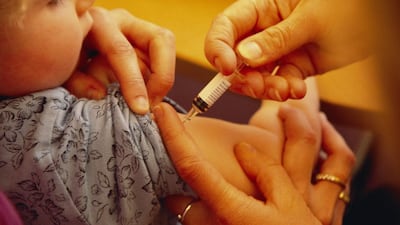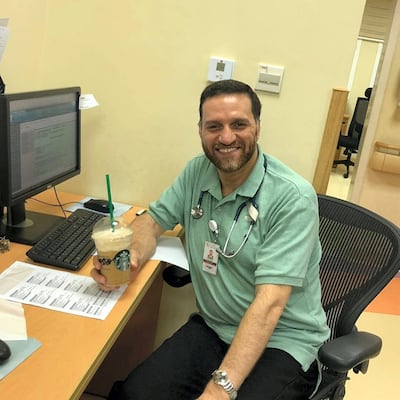Doctors have warned that a growing “anti-vaccination” movement is gaining traction in the UAE, as new research suggested one in 10 parents are against inoculating their children.
The survey results, which also suggested high levels of scepticism towards new vaccinations and a lack of awareness of their benefits, emerged as measles cases surge across the globe.
Medics at the top government-run hospital that carried out the study hope the vaccine message will get through to parents.
Last month The National reported how the UAE was bucking a worrying worldwide trend in the spread of measles, with 826 cases in 2015 falling to 173 in 2018.
That followed one of the largest public health campaigns in the UAE, in which 1.5 million children were inoculated against measles.
But the global spread of anti-vaccination conspiracy theories has been blamed for recent measles outbreaks in countries including the US, Germany and Japan.
Unfounded claims about a link between the measles, mumps and rubella vaccine and autism are among the myths, often spread online, discouraging parents from having their children vaccinated.
Beliefs that vaccinations are unnecessary because the diseases they protect against no longer pose a real threat are also becoming more widespread in the UAE, said Dr Hossam Al Tatari, director of paediatrics at the Heart Medical Centre in Al Ain.
“The movement is there and unfortunately we have to admit it is quite strong,” Dr Al Tatari said.
“It has led to a significant decrease in rates of vaccination in some parts of the world. We need to face it and we need to confront it.
“Are we seeing anti-vax people in the UAE? Yes. Their voice is loud and some parents have started to be affected by that.
"We used to celebrate 100 per cent uptake of vaccines in the UAE. Now it's less than that.”
The study, authored by Dr Al Tatari and four staff members at Tawam Hospital in Al Ain, surveyed almost 400 parents across the UAE last year.
While most saw the benefits of vaccinations, 10 per cent did not agree that vaccines were effective in preventing certain diseases.
Almost half did not know that vaccinations can prevent some forms of cancer, while 36 per cent, would either be unsure about or would not agree to giving a new vaccine to their child.
Dr Al Tatari, also an adjunct professor at the University of Western Ontario in Canada, said he supported the authorities taking a harder line against parents who refuse to vaccinate children.
He backed laws being introduced in other countries criminalising parents who reject protection.
In New York City, 84 people face fines of up to $2,000 (Dh7,346) after being summoned to court for refusing to vaccinate their children. Germany’s Health Ministry is proposing the introduction of fines of up to €2,500 (Dh10,285).
On Tuesday, UAE head teachers were urged to help improve vaccination rates and stave off the threat of preventable diseases.
Dr Hussein Al Rand, assistant undersecretary at the Ministry of Health and Prevention, urged schools to help to bolster vaccination coverage among pupils as part of the National Immunisation Programme.
Parents have recently been urged to ignore unreliable rumours about the need for the human papillomavirus (HPV) vaccine and encouraged to ask for regular tests.
In the UAE, a series of vaccinations are given from birth to 18 months, with a second round given when children start school, protecting against diseases such as measles, polio and chickenpox.
In Grade 11 more vaccines are given, including the HPV inoculation for girls, which protects against the main cause of cervical cancer.
Parents are asked to sign consent forms before shots are given at schools. While schools have the power to refuse to admit pupils who have not been vaccinated, the rule is almost never enforced, Dr Al Tatari said.
He also called for anti-vax campaigners to be given a platform by the mainstream media to debate against medical experts, so that their arguments could be shown as false.
Respected media outlets have traditionally been reluctant to feature the conspiracy theorists for fear of helping them to spread their message, but Dr Al Tatari said this was no longer viable because they built up huge followings on social media.
“They have 1.5 million followers, they are already famous,” he said. “I think one way to stop them is by a debate that is well conducted, that we can then spread over social media ourselves.
"I have 1,000 per cent trust in winning that debate because I know all the bogus things they talk about.
“I have personally sent bloggers invitations for a debate in a public place. They have all rejected it and some of them even blocked me.
“We need to assure people of safety and efficacy. There needs to be a bit more transparency about the process of getting vaccines into the country, so people can see the amount of time and effort that is put towards assuring the quality and safety.
“Vaccinations are saving three million lives a year, not to mention the hospital beds and doctor visits. We need to highlight those numbers more.”
Recent figures published by the World Health Organisation showed that there had been only nine confirmed cases of measles in the first four months of this year in the UAE.
But there have been recent outbreaks in Saudi Arabia and Yemen.
Across the world, cases of measles tripled worldwide in the first three months of 2019, compared to the same period last year.
The largest increase was in Africa, with a 700 per cent rise in cases. The worst affected countries included Ukraine, Madagascar and India.
Sameh Abdulmagid, a paediatrician at Bareen International Hospital in Abu Dhabi, said he was being questioned more often by parents who were unsure about whether their children should have vaccinations.
“The majority of the people are still following schedule and giving the vaccinations, but there is a minority of people, increasing in numbers, asking about their value,” Dr Abdulmagid said.
“Social media has a major effect, people sharing on Facebook any problem. People are reading that they have a part in causing problems like autism.
“Our message is that vaccinations do not harm people. They prevent a lot of diseases from affecting our children.
"In the UAE we are a multinational country. People might come from elsewhere carrying viruses, so we have to protect, and the protection is always better than the cure.”
He said progress in reducing prevalence of diseases such as measles through vaccination programmes had also convinced some parents that the threat of their children catching them is remote.
“Parents think the diseases are not common nowadays so they do not realise the risk," Dr Abdulmagid said.
“People here trust the health authorities and any instructions directly to the families do convince them.
"They should send messages and share in the media, on the radio, that it is important for the health of the children.
“We should also use social media such as Facebook and Twitter to advise people of the importance of vaccinations.
“Right now, we don’t have a problem with an increase of these disastrous diseases. But we are always worried about our children, and we are advising the families about the vaccinations.
"The outbreak that has happened in the US is an alarming signal. We should take our precautions.”


